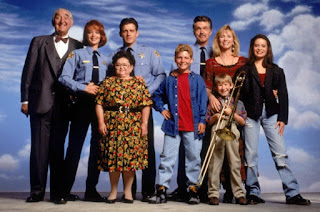David E. Kelley, recently a 2016–17 Emmy nominee for writing in a limited series or movie for best miniseries winner HBO’s Big Little Lies, created this next anniversary premiere, Picket Fences.
Debuting September 18, 1992, on CBS, it has now been 25 years since this strange but controversial series aired for four seasons on Friday nights. Set in the fictional town of Rome, Wisconsin, and with a small-town atmosphere where everything in the world seems to be happening in Rome, Wikipedia.org presents the following description of Picket Fences:
“The show dealt with unusual topics for prime-time television such as abortion, incest, homophobia and LGBT adoption, transsexuality, racism, belief in God, medical ethics, polygamy, polyamory, adolescent sexuality (including nocturnal emission), date rape, cryonics, the Holocaust, shoe fetishism, masturbation, animal sacrifice, spontaneous combustion, and constitutional rights. Illustrative of the subject matter is that the regular cast included a judge, two lawyers, and a medical examiner. Religious issues were frequently discussed, and the town's Roman Catholic and Episcopal priests were frequently recurring characters.”
Rome is represented by sheriff Jimmy Brock (Tom Skerritt) and his physician wife Jill (Kathy Baker). Working for Jimmy are police officers Kenny Locos (Costas Mandylor) and Maxine Stewart (Lauren Holly) and secretary Ginny Weedon (Zelda Rubinstein). Many of the court cases are presided by judge Henry Bone (Ray Walston) with arguments by the bombastic defense attorney Douglas Wambaugh (Fyvush Finkel) and, beginning with the second season, D.A. John Littleton (Don Cheadle). The city gets its share of mayors, including in the second season Rachel Harris (Leigh Taylor–Young), who is eventually ousted from office because of her past as a porn star. Jimmy and Jill’s children are Kimberly (Holly Marie Combs), Matthew (Justin Shenkarow), and Zack (Adam Wylie).
One Picket Fences storyline which stood out, very politically, was desegregation. It aired during the third season, on October 14, 1994. It was titled “Enemy Lines.” This episode had then-acting mayor Jill defying a busing order by federal judge Harold Nance (Paul Winfield, whose performance won him the 1994–95 Emmy for guest actor in a drama series).
Picket Fences was never a ratings winner. It peaked at No. 61 with the 1993–94 season. It was a blockbuster at the Emmys, winning for its premiere 1992–93 season the top three categories of its genre: outstanding drama series, lead actor for Tom Skerritt, and lead actress for Kathy Baker. It repeated winning the series prize, over the favored debut season of ABC’s NYPD Blue, for 1993–94 and which also resulted in supporting-acting wins for Fyvush Finkel and Leigh Taylor–Young and guest actor Richard Kiley (playing Jill’s father). The 1994–95 and 1995–96 seasons reaped lead actress and supporting actor wins for Kathy Baker and Ray Walston. Picket Fences achieved all this despite never having been nominated for directing or writing—something that doesn’t normally happen for any winning best comedy or drama series these days. (They usually get a nomination slot to back up being able to win for best drama or comedy series. The NBC sitcom Friends was the last to pull off a series win without a directing or writing nod. That goes back to 2002.)
Below is a YouTube-uploaded video, not in good quality, of the above-mentioned episode “Enemy Lines” of Picket Fences.

No comments:
Post a Comment